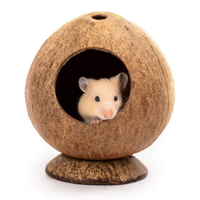Why is my hamster sleeping in the corner of their cage? A vet shares 4 common reasons
An expert explains why your hamster is sleeping in the corner of their cage—and what you can do about it!
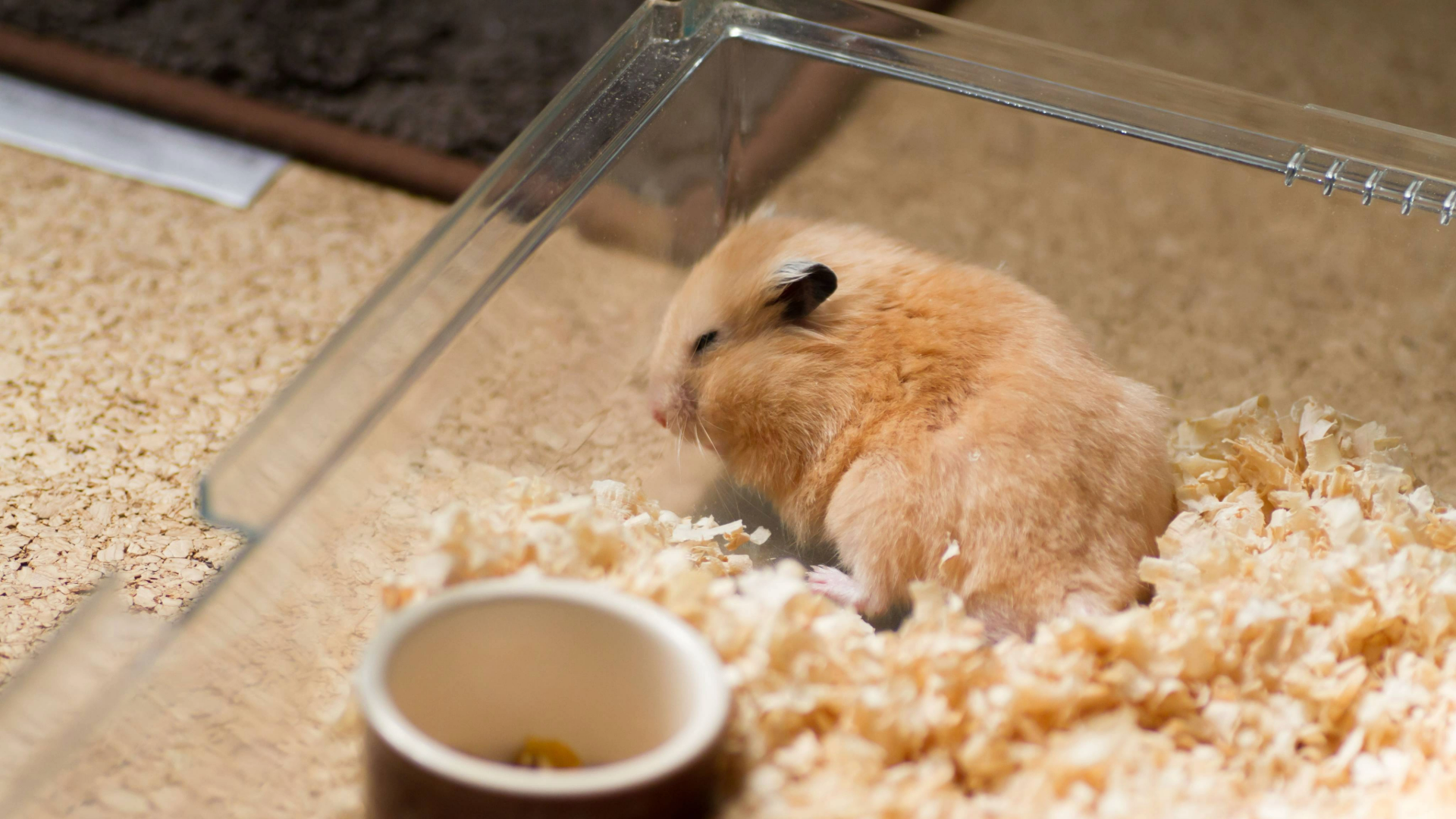
If your hamster is sleeping in the corner of their cage, you might wonder if this is a cause for concern. While this behavior doesn’t always indicate a problem, it can sometimes signal fear, illness, or environmental issues that need to be addressed.
If it’s a case of their environment, ensure they have one of the best hamster cages which is clean, safe, warm, and positioned away from people, pets, and loud noises. Hamsters might be small, but these little creatures are more sensitive than you might think!
To help you work out why your hamster is sleeping in the corner of their cage, we’ve called in Dr. Rebecca MacMillan, an expert vet with 15 years of experience. Below, she explains four common reasons for this behavior and what you can do to help your furry friend.
Why is my hamster sleeping in corner of their cage?
There are a range of contributing factors that can cause your hammy to choose the corner of their cage to sleep in. Some are completely benign, while others have the potential to be more of a concern.
1. Fear
If you’ve only just welcomed your little pocket pet into your family, it could be that your hamster is scared of you and this is causing them to want to spend all of their time sleeping in the corner of their cage. Hamsters tend to be highly suspicious creatures and it can take some time for them to trust both you and their new environment.
But for those of you that have had your hamster for a while, it’s likely that other things are driving their fear-based behavior. Loud noises, sudden movements, and changes to their environment are all things that can freak a hammy out and when a hamster is scared, they tend to hide.
Normal hamster behavior will see your pocket pet sleeping a lot during the day but being fairly active at night. If you notice that your hammy seems to be sleeping in the corner of their cage for much of the day and night, it could be that their threat system has been activated and they’re feeling scared.
Dr. MacMillan says: "The corner of the cage could be where your hamster feels safest when they are frightened. The corner offers more security than being out in the open. So, if your hamster prefers hiding in the corners when they are awake, as well as when they are sleeping, then this could be a sign they are feeling anxious."
Coconut Hut Hamster House Bed | Amazon
This cozy coconut hideaway was voted as one of the best hamster toys in our buying guide. Fill it up with some bedding, and it becomes the perfect place for your pocket pet to snuggle into and get some rest. Thanks to the all-natural materials, it makes a great eco-friendly choice.
2. Illness
Hamsters don’t tend to show signs of illness until they are really sick, so if you notice your hammy is sleeping a lot and that they’re huddled into the corner of their cage, this is worth paying attention to. Excessive sleeping and uncharacteristic hiding behaviors are a good sign your pocket pet isn’t feeling well. If you're wondering, 'How long do hamsters live?' we've answered your question in this feature.
You also want to be on the lookout for other signs and symptoms as well, such as:
- Cloudy, sunken, or swollen eyes
- Hair loss
- Weight loss
- Diarrhea
- Constipation
- Sneezing
- Discharge from the eyes, nose or mouth
- Heavy breathing
- Tumors
- Off their food
- Exercising less than usual
- Sleeping more
If you notice any of the above or you’re simply concerned about the amount of time your hammy is sleeping or where they’re choosing to do it, we recommend you make an appointment with your vet who will be able to give your pocket pet a good check-up.
Dr. MacMillan says: "If your hamster is sick then they may not have the energy to dig and bury themselves in a substrate, or even to go off to their normal sleeping quarters. These hamsters will curl up in the corner of their cage instead, where they can get maximum security with minimum energy expenditure.
"In rare cases, a disease affecting your hamster’s brain could cause them to press their head into the corner of their enclosure. They would be doing this while awake, not just when sleeping, and may show other symptoms like seizures."
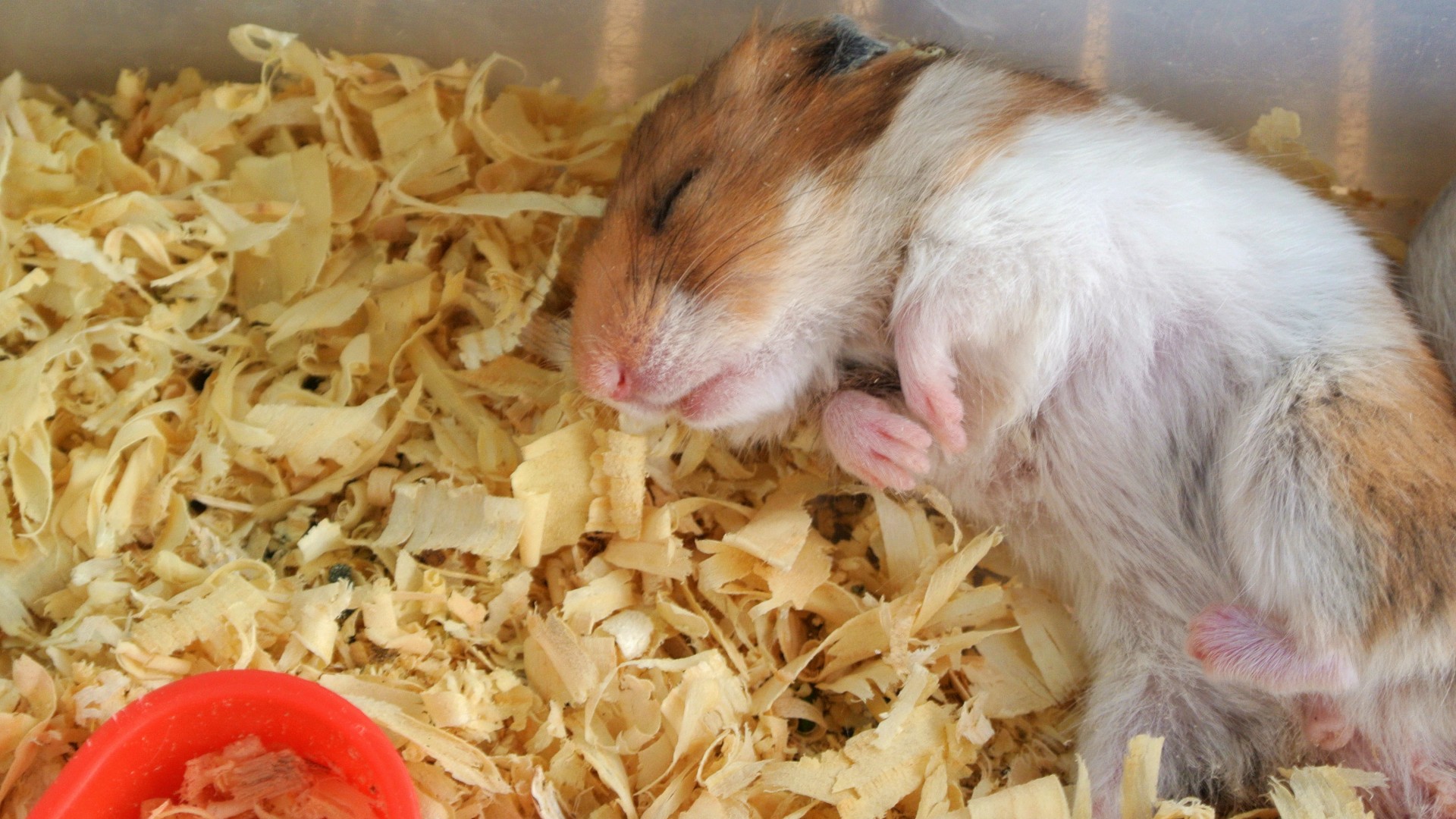
3. Issues with their environment
Hamsters are not ones for putting up with things they don’t like and they’ll tend to distance themselves from anything that displeases them. When it comes to their sleep spot they’re very particular - it has to be cozy, warm, secure and above all else, clean.
Learning how to clean a hamster cage is one of the most beneficial things you can do as a pet parent. Your hammy may be more inclined to sleep in another spot if their cage is regularly freshened up. This means changing soiled bedding daily, cleaning their water and food bowls, and doing a deep clean once a month.
Aside from hygiene reasons, your hammy may also be sleeping in the corner because there are things going on in the surrounding home environment that are unsettling them. Lots of loud noises, from people or other pets, as well as having family members trying to touch or handle them, can cause hamsters to want to burrow into a corner where they feel safe.
Dr. MacMillan says: "Your hamster may not have enough hiding places in their enclosure which is why they are seeking out a corner for security instead. The ideal hamster habitat should have multiple hiding spots and a deep substrate layer to make burrows in."
Kaytee Clean & Cozy White Paper Bedding | Amazon
This absorbent paper bedding can hold up to six times its weight in liquid, helping to keep your hamster feeling fresh and clean. It’s also fragrance- and dust-free and has an odor-control guarantee.
4. It’s their favorite sleep spot
Why is your hamster sleeping in the corner of their cage? Well, it could be that it’s simply their favorite place to get their beauty sleep. Hamsters love creating a little nest for themselves and what’s most important for them is that it’s warm, cozy, secure and somewhere that they can really burrow into.
If you find food or other items from around their cage tucked away in the corner, this is a good sign that your hammy is choosing to make the corner of their cage their home.
Dr. MacMillan says: "A corner could simply be your hamster's favorite sleeping spot in their enclosure! Perhaps this is just where they feel most comfortable and safe. A hamster that likes sleeping in a corner for these reasons will usually make themselves a comfortable nest and store their food here too."
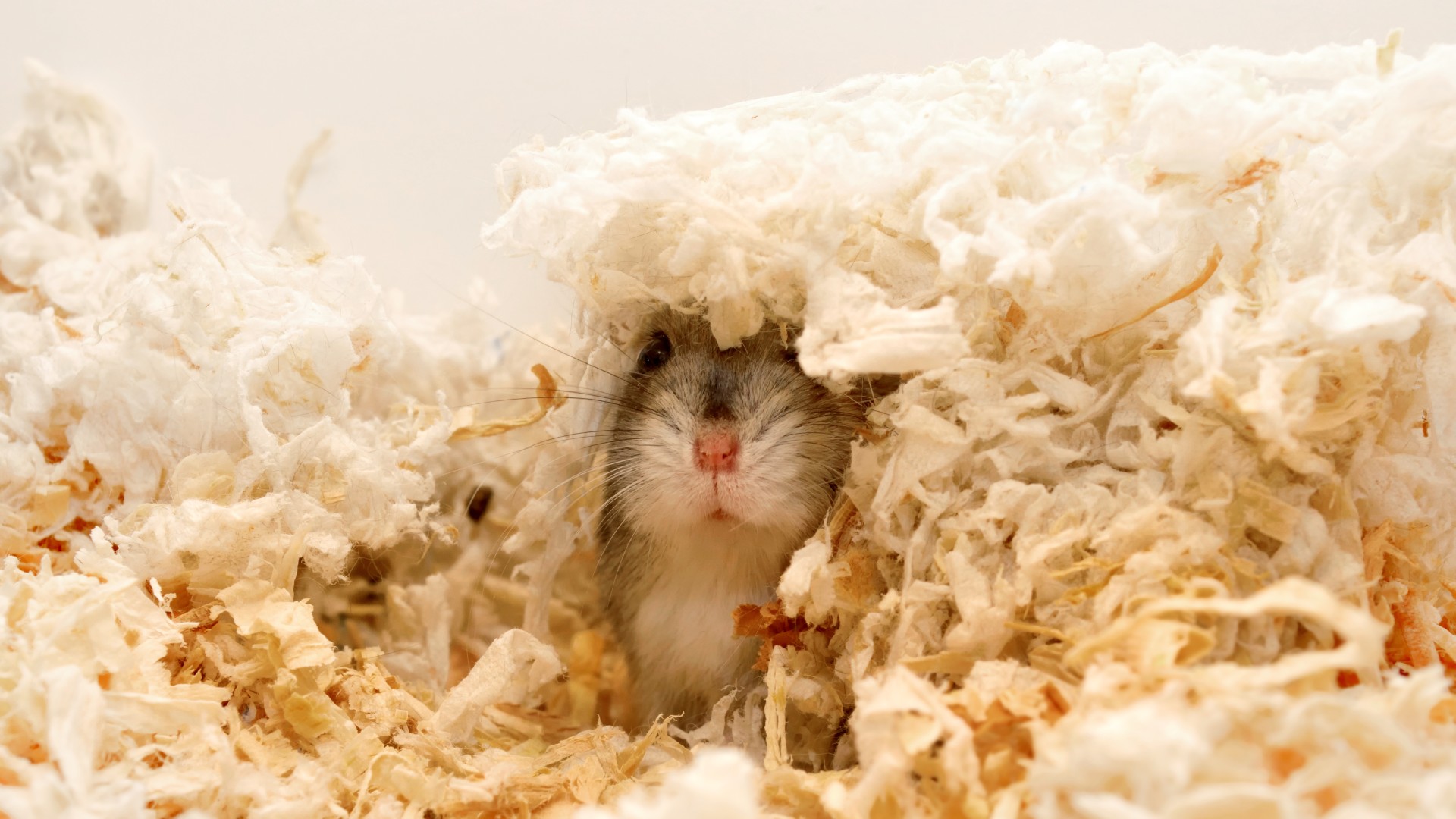
What to do if your hamster is sleeping in corner of cage
Because hamsters are prey animals that are easy targets in the wild, it’s natural for them to want to sleep in a place where they feel safe and secure. If your hammy is engaging in normal sleeping practices (dozing during the day but being fairly active at night) it’s unlikely that their choice of sleep spot is any cause for concern.
Likewise, if your hamster is continuing to eat well, plays with the best hamster toys you’ve bought them when they are awake, and is engaging in normal hamster behaviors, such as chewing, digging, and burrowing, then it’s safe to say that they’re sleeping in the corner of their cage because that’s the place they’ve chosen to set up camp so to speak.
There’s absolutely nothing you need to do if your hamster is sleeping in the corner of their cage because that’s the place they feel the most comfortable and secure, but it is worth paying attention if you see this being accompanied by any out of the ordinary behaviors, such as:
- Lethargy
- A refusal to eat or drink
- Not chewing
- Uncharacteristic hiding during normal waking hours (that’s night time for your furry friend)
- Any of the signs of illness mentioned earlier in this piece
- Losing weight
- Exercising less
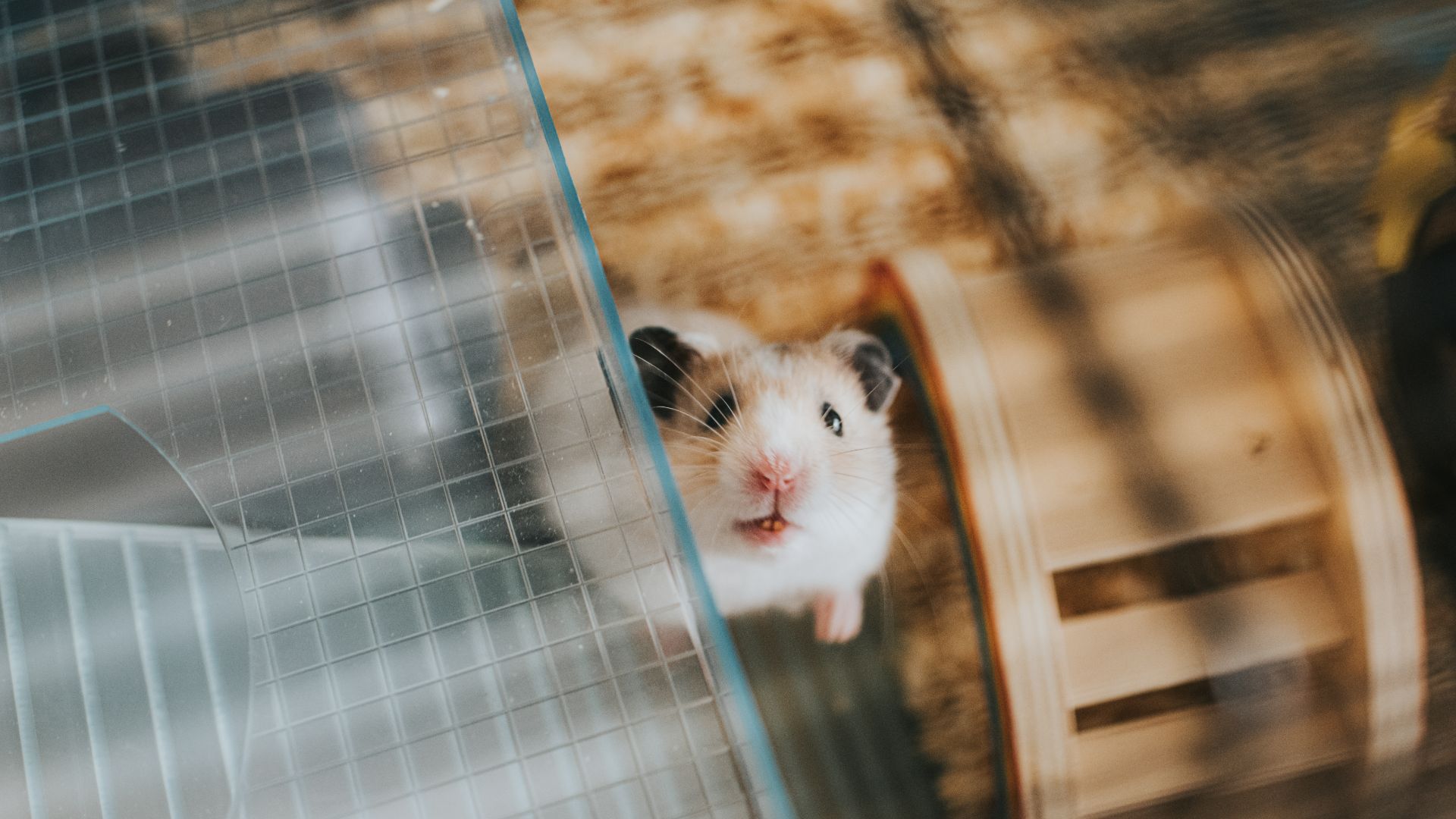
If you’re in any way concerned about the health and wellbeing of your furry friend, we recommend you speak with your vet who will be able to offer advice and guidance.
Dr. MacMillan adds: "If your hamster seems ok, then check their enclosure next. Have you provided enough tunnels, hides, and substrate? You could try offering alternatives or repositioning the current furniture in their cage to see if this encourages them to sleep elsewhere.
"A hamster that generally seems anxious may spend many of their waking hours hiding in corners as well as choosing to sleep there. You will need to look at any factors that could be causing stress. Frequent rough handling, other larger pets in the house, or loud music are all common examples. Take steps to correct these to give your hamster a more peaceful existence.
"If your hamster is bright and doing all the things that they should be doing, then let them continue sleeping in the corner. It might be their favorite snoozing spot, so don’t worry if they choose there in preference to anywhere else. Don’t disturb their carefully crafted nest, unless it is cleaning out time, and never force them to sleep elsewhere as this could create unnecessary stress."
You might also find it helpful to check out our guides on how to help a stressed hamster and ways to keep your hamster happy, both of which are helpful if you’re worried your pocket pet is feeling fearful or anxious.

Rebecca is a vet surgeon who graduated in 2009 from the Royal Veterinary College in London. She has a wealth of experience in first opinion small animal practice, having done a mixture of day-to-day routine work, on-call emergency duties and managerial roles over the years. She enjoys medicine in particular and she is proud to have recently achieved a BSAVA postgraduate certificate in small animal medicine (with commendation). She writes on various feline and canine topics, including behavior, nutrition, and health. Outside of work and writing she enjoys walking her own dog, spending time with her young family and baking!
PetsRadar Newsletter
Get the best advice, tips and top tech for your beloved Pets

Kathryn is a freelance writer who has been a member of the PetsRadar family since it launched in 2020. Highly experienced in her field, she's driven by a desire to provide pet parents with accurate, timely, and informative content that enables them to provide their fur friends with everything they need to thrive. Kathryn works closely with vets and trainers to ensure all articles offer the most up-to-date information across a range of pet-related fields, from insights into health and behavior issues to tips on products and training. When she’s not busy crafting the perfect sentence for her features, buying guides and news pieces, she can be found hanging out with her family (which includes one super sassy cat), drinking copious amounts of Jasmine tea and reading all the books.
- Dr Rebecca MacMillanVet
- Megan MilsteadStaff Writer
